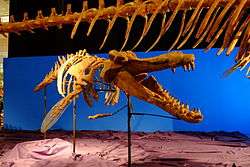Brygmophyseter
| Brygmophyseter Temporal range: Miocene | |
|---|---|
 | |
| Restored skeleton | |
| Scientific classification | |
| Kingdom: | Animalia |
| Phylum: | Chordata |
| Class: | Mammalia |
| Order: | Artiodactyla |
| Infraorder: | Cetacea |
| Superfamily: | Physeteroidea |
| Family: | incertae sedis |
| Genus: | †Brygmophyseter Barnes, 2006[1] |
| Species: | †B. shigensis |
| Binomial name | |
| Brygmophyseter shigensis (Hirota and Barnes, 1995) | |
| Synonyms | |
| |
Brygmophyseter is an extinct genus of toothed whale in the sperm whale family with one species, B. shigensis.[1] When first described, this species was placed in an extinct form genus Scaldicetus of toothed whales, as S. shigensis.[1][2] In 2006, two new genus names were independently created for the species: Naganocetus and Brygmophyseter. Since Brygmophyseter was published first, Naganocetus became a junior synonym.[3]
Etymology
The genus name is a combination of the Greek word brygmos, which means "biting" or "gnashing", combined with suffix physeter, which is the generic name of the living sperm whale, and which is also the Greek word for "blower".[1][4] This has led to the occasional vernacular term "biting sperm whale" being given to the species in popular culture.[5]
Holotype specimen
The holotype specimen (SFM-0001) was excavated from the Bessho Formation in the Nagano Prefecture in Japan in 1988 by the residents of Shiga-mura with assistance from the staff of the Shiga Fossil Museum.[1] The specimen is nearly complete,[1] and includes a 140-cm-long (4' 7'' ft) skull.[2] This specimen came from 15– to 14-million-year-old sediments.[1] Unlike the extant sperm whale, Physeter macrocephalus, which has teeth in its lower jaw only, Brygmophyseter has 12 functional teeth on each side of its lower jaw and 12 functional teeth on each side of its upper jaw.[1] The holotype specimen is currently on display in the Gunman Museum of Natural History in Japan.[1]
Size
The holotype specimen is around 7 m (23 ft) long.[6] However, in popular culture, Brygmophyseter have been depicted significantly larger in size – up to 12 m (39 ft) long.[5]
Behavior and predatory capabilities

Brygmophyseter was likely among the apex predators of its time.[5] It packed formidable jaws armed with teeth up to 14 cm (5.5 in) long.[4] It may have employed sonar to track prey items in deep waters, like the modern sperm whales.[5] It may also have used its large head to ram a potential opponent during conflict.[5] Brygmophyseter would also have lived in social groups called pods, and probably hunted in packs, like modern age killer whales.[5]
Dietary preferences
Brygmophyseter is assumed to have preyed upon a variety of animals, including fish,[5] pinnipeds,[5] giant squid,[5] and other cetaceans.[5]
The remains of undetermined mysticeti whales have been found in the same region where the holotype specimen was found,[1] but a predator-prey relationship between Brygmophyseter and these whales has not been inferred in the scientific literature.[1]
Potential threats
The shark species C. megalodon was likely a primary predator of the sperm whales.[5][7] A large number of cetacean bones have been found with large bite marks (deep gashes) in them, which were caused by teeth that belong to C. megalodon.[5]
Related species
See also
References
- 1 2 3 4 5 6 7 8 9 10 11 Kimura, T; et al. (2006). "Fossil sperm whales (Cetacea, Physeteridae) from Gunma and Ibaraki prefectures, Japan; with observations on the Miocene fossil sperm whale Scaldicetus shigensis Hirota and Barnes, 1995" (PDF). Bulletin of the Gunma Museum of Natural History. 103: 1–23.
- 1 2 "Shigamakkoukujira (Scaldicetus shigensis)".
- ↑ Lambert, Olivier; Bianucci, Giovanni; Demuizon, Christian (2008). "A New Stem-Sperm Whale (Cetacea, Odontoceti, Physeteroidea) from the Latest Miocene of Peru". Comptes Rendus Palevol. Elsevier Masson SAS. 7: 361–369. doi:10.1016/j.crpv.2008.06.002.
- 1 2 "Research & Collection News" (PDF). Paleontology. Natural History Museum of Los Angeles County. May 2006. Retrieved 29 April 2010.
- 1 2 3 4 5 6 7 8 9 10 11 12 "Dinopedia from History Channel: Brygmophyseter". Retrieved 4 June 2010.
- ↑ "Brygmophyseter Shignesis in Shiga Fossil Museum, Japan".
- ↑ Fossil Farm Museum of the Finger Lakes: Megalodon
External links
- Brygmophyseter Skeleton on display in a Japanese Museum
- Brygmophyseter, ancient killer sperm whale
- Age of Mammals – Specimen Spotlight – Aulophyseter morricei (This video also contains information about Brygmophyseter)